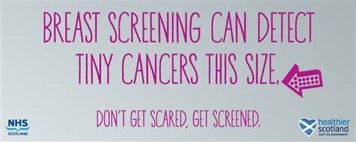Cancer/Detect Cancer Early
TWICE as many people in Scotland survive cancer compared to 30 years ago
Thanks to earlier detection, research breakthroughs and treatment advances, more people are surviving cancer than ever before.
In fact, the more we share the positives around cancer, the more lives we can save. Together we can turn the Big C into the ‘wee c'.
Cancer. It's not what it used to be.
However, if you're at all worried about a symptom, or you notice any unusual change in your body, don't let fear or embarrassment stop you from getting it checked – visit your GP.
It's probably nothing but if it is something, they have a better chance of successfully treating it if it's caught early.
Signs and symptoms
Below are some potential signs and symptoms of cancer that are worth visiting your GP about.
Remember, having one of these doesn't necessarily mean you have cancer, it could be a sign of something else, but either way it's better to have your concern checked out.
- A new lump in the breasts, testicles or anywhere else that appears or an existing lump that gets bigger
- A sore that doesn't heal up – in the mouth, throat or on the skin
- A mole that changes shape, size or colour
- Any growth that appears on the skin and continues to grow
- Coughing up blood, or blood in the urine or mixed through stools (poo)
- Things that don't clear up, like a cough that doesn't go away, or a pain somewhere that won't settle
- A change in the pattern of going to the toilet
- Unexpected weight loss (when you have not been trying to lose weight)
For more information on other signs and symptoms, visit: www.getcheckedearly.org
Prehabilitation for Scotland: Small changes make a big difference
You may only have a short time between finding out you have cancer and treatment starting but small changes, as advised on the website, can make a big difference. In fact, evidence shows that actively improving your physical and mental health can help you recover more quickly from surgery, chemotherapy and radiotherapy, and reduce the chance of problems during and after treatment.
The new Prehabilitation for Scotland website has lots of information about what you can do to prepare for treatment, and feel better, mentally and physically. Find out more by visiting: https://bit.ly/3y1rrAl
Western Isles Cancer Care Initiative (WICCI)
WICCI offers specific support to reduce financial hardship for cancer patients in the Western Isles, and work in partnership with Macmillan Cancer Support. The Macmillan Benefits Service is a benefits advice service for people affected by cancer, their families and carers. It is a partnership between Macmillan Cancer Support and Comhairle nan Eilean Siar. We also work closely with other partner organisations such as The Pension Service, NHS Western Isles, Home Energy Scotland and Tighean Innse Gall. We recognise that for many people money worries and living with a cancer diagnosis are a major cause of stress.
Individuals should get in touch with the WICCI office direct, or speak to their Macmillan Nurse, GP, or anyone else involved in their care. All applications are assessed by the WICCI Office staff and sent to their Trustees for approval. Please be assured that all information is treated in the strictest confidence, and assessments of funding are presented to the WICCI Trustees anonymously.
Please do not hesitate to contact the friendly team at WICCI if you have any issues or financial burdens arising from a cancer diagnosis or treatment. Find out more by telephoning (01851) 706721 or visiting their website at: https://wicci.org.uk/
Macmillan Benefits Service (Western Isles)
When you or someone close to you has been diagnosed with cancer, money might not be one of the first things you think about, but having cancer can be expensive. Your diagnosis and treatment may lead to loss of earnings or additional costs e.g. heating, a special diet, childcare or travel to a mainland hospital. If you are struggling to cope with the financial impact of cancer, remember help is available.
The Macmillan Benefits Service (Western Isles) recognises that for many people money worries and living with a cancer diagnosis are a major cause of stress and our aim is to ensure that families and carers are applying for the benefits they are entitled to. As well as offering a free, confidential, impartial and non-judgemental advice service for cancer patients, their families and carers throughout the Western Isles, the Macmillan Benefits Adviser can:
- help you claim all the benefits that you are entitled to
- offer information and advice
- liaise with other agencies on your behalf
- apply for Department for Work and Pension benefits
- apply for Social Security Scotland benefits
- appeal against benefit decisions
- access charitable grants which can help towards fuel costs or mainland travel
- apply for transport concessions such as the Blue Badge or National Entitlement Card.
The service is delivered on a one-to-one basis through visiting you in your home, in hospital or in a setting where you feel most comfortable. We also work closely with other partner organisations such as The Pension Service, NHS Western Isles, Home Energy Scotland and Tighean Innse Gall.
The Macmillan Benefits Service (Western Isles) is open Monday to Friday from 9am to 5.30pm and can be contacted via telephoning 01851 822644 or 0792 002 0500 (mobile), or email: macmillan.benefits@cne-siar.gov.uk
 The Detect Cancer Early (DCE) programme is aimed at raising the public's awareness of the national cancer screening programmes and also the early signs and symptoms of cancer to encourage them to seek help earlier.
The Detect Cancer Early (DCE) programme is aimed at raising the public's awareness of the national cancer screening programmes and also the early signs and symptoms of cancer to encourage them to seek help earlier.
What is screening?
Screening is an NHS service offered to you if you are at risk of certain conditions. Screening tests are not compulsory but are offered to help you make an informed choice about your health or the health of your child. You can then be offered information, further tests and appropriate treatment to reduce the risk and complications arising from the disease or condition.
Why is screening important?
Screening can find serious conditions early, before you get any symptoms. The earlier the condition is found, the better your chance of dealing with it. If a condition is found early, it is less likely to become severe and you are less likely to need major treatment.
Regular screening can reduce the number of deaths from particular conditions.
Cancer screening and campaigns
 In recent years, a number of local cancer survivors have shared their personal stories to help raise awareness of the Detect Cancer Early campaign.
In recent years, a number of local cancer survivors have shared their personal stories to help raise awareness of the Detect Cancer Early campaign.
NHS Western Isles would like to take this opportunity to thank each individual sharing their story.
 NHSWI Lumps Aren't the Only Sign of Breast Cancer
NHSWI Lumps Aren't the Only Sign of Breast Cancer- Quit Your Way Hebrides
- Cancer Information in your language (Macmillan Cancer Support)
- Audio, PDF and eBooks (Macmillan Cancer Support)
- Easy-read titles (Macmillan Cancer Support)
‘My Patient Journey' and ‘My Journey to Diagnosis'
Both titles ‘My Patient Journey' and ‘My Journey to Diagnosis' are personal guides to help patients and/or their carers to record, understand and process the information they may receive at clinical appointments.
My Journey to Diagnosis should be used BEFORE a diagnosis is given.
My Patient Journey should be used AFTER a diagnosis is given.
 NHS inform – https://www.nhsinform.scot
NHS inform – https://www.nhsinform.scot- Get Checked Early – http://www.getcheckedearly.org
- the wee c – http://www.theweec.org
- World Cancer Research Fund International – https://www.wcrf.org/
- NHSWI Patient Travel – http://www.patienttravelwi.scot.nhs.uk/
Support Services
Local Support Groups & Services
- Macmillan Benefits Service (Western Isles) – 01851 822644 or 0792 002 0500 (mobile), or email: macmillan.benefits@cne-siar.gov.uk
- Western Isles Cancer Care Initiative (WICCI) – http://wicci.org.uk/
- Hebridean Men's Cancer Support Group – http://www.hebmenscancer.com/
- Barra Cancer Support Group – https://www.facebook.com/pg/Barra-Cancer-Support-Group-639882192731790/about/?ref=page_internal
- Eaval Cancer Support Group – Anne Rabbitts, jarabbitts@gmail.com
- Lewis & Harris Women's Cancer Support Group – http://www.lhbcsg.org/
- Move More – https://www.macmillan.org.uk/information-and-support/coping/maintaining-a-healthy-lifestyle/keeping-active/tools-help-move-more.html
- NHSWI Patient Travel – http://www.patienttravelwi.scot.nhs.uk/
- Tighean Innse Gall – https://www.tighean.co.uk
- Uist Cancer Care Forum – https://www.facebook.com/uistcancercareforum
National Support Groups & Services
- Bowel Cancer UK – https://www.bowelcanceruk.org.uk/
- Breast Cancer Care – https://www.breastcancercare.org.uk/
- Cancer Research UK – https://www.cancerresearchuk.org/
- Cancer Support Scotland – https://www.cancersupportscotland.org
- Carers Trust – https://carers.org/
- Macmillan Cancer Support – https://www.macmillan.org.uk/
- Maggie's Centres – https://www.maggiescentres.org/
- Marie Curie Cancer Care – https://www.mariecurie.org.uk/
- Prostate Cancer UK – https://prostatecanceruk.org/
- Target Ovarian Cancer – https://www.targetovariancancer.org.uk/
- Testicular Cancer – https://uk.movember.com/
NHS Boards & Networks
- NHS Western Isles – www.wihb.scot.nhs.uk
- NHS 24 – https://www.nhs24.scot/
- NHS Greater Glasgow & Clyde – http://www.nhsggc.org.uk/
- NHS Highland – http://www.nhshighland.scot.nhs.uk
- NHS Lothian – https://www.nhslothian.scot.nhs.uk
- NOSCAN (North of Scotland Cancer Network) – http://www.noscan.scot.nhs.uk
- NEXT PAGE: Our Services - NoS PGDs
- LAST REVIEWED ON: March 11, 2024